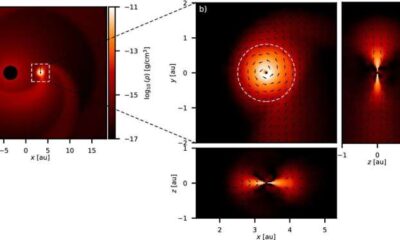Science
New Blood Test Revolutionizes Treatment for Stage 3 Colon Cancer

A groundbreaking blood test that detects cancer DNA could significantly change treatment processes for patients diagnosed with stage 3 colon cancer. Developed by a team led by Dr. Yuxuan Wang, an assistant professor of oncology at Johns Hopkins Medicine, this innovation allows healthcare providers to personalize chemotherapy regimens based on an individual’s unique genetic profile.
Historically, colon cancer treatment has followed a one-size-fits-all approach, typically involving surgery followed by a standardized chemotherapy regimen. This method, while effective for some, often resulted in unnecessary toxicity for others. “When we developed the chemotherapy regimen, it was a very powerful regimen and everybody got the same thing,” Dr. Wang noted. “It might be too much for some people. It might not be enough for others, but everybody gets the same thing.”
The research, published on October 20, 2023, in the journal Nature Medicine, underscores the importance of personalized medicine in cancer treatment. By identifying which patients can tolerate lower doses, or may not need chemotherapy at all, the test aims to alleviate the often debilitating side effects associated with conventional treatment. “It’s a pretty toxic regimen, which can lead to long-term neuropathy or numbness,” Dr. Wang explained. “It’s a tough regimen to be on for months at a time.”
Collaborating with treatment centers in Australia and Canada, the study was largely funded by the National Institutes of Health. The findings are particularly timely, as the American Cancer Society has reported a marked increase in colorectal cancer diagnoses among adults aged 45 to 49 in recent years. This rise has prompted the society to lower the recommended screening age from 50 to 45, effective since 2018.
The combination of earlier screening and personalized treatment options presents a promising outlook for patients. “A patient might not need a second round of chemo,” Dr. Wang stated, emphasizing the potential benefits of this new testing method. “On the other hand, if someone needs a more intense chemotherapy regimen, they should get it. Otherwise, we’re complicating their treatment, survival, and relapse rate.”
There are also implications for patients with stage 2 colon cancer, where similar personalization opportunities exist. However, once cancer recurs in the body, it tends to return in a more aggressive form, making treatment more challenging. “Now we have a better test to detect tumor DNA in the blood,” Dr. Wang remarked. “It’s more sensitive and more specific.”
As the medical community moves toward more individualized treatment plans, innovations like this blood test signal a shift in how cancer care may evolve. By focusing on the unique needs of each patient, healthcare providers can enhance treatment effectiveness while mitigating adverse effects, ultimately improving outcomes for those facing colon cancer.
-

 Science2 months ago
Science2 months agoOhio State Study Uncovers Brain Connectivity and Function Links
-

 Politics2 months ago
Politics2 months agoHamas Chief Stresses Disarmament Tied to Occupation’s End
-

 Science1 month ago
Science1 month agoUniversity of Hawaiʻi Joins $25.6M AI Project for Disaster Monitoring
-

 Entertainment2 months ago
Entertainment2 months agoMegan Thee Stallion Exposes Alleged Online Attack by Bots
-

 Science4 weeks ago
Science4 weeks agoALMA Discovers Companion Orbiting Giant Star π 1 Gruis
-

 Science2 months ago
Science2 months agoResearchers Challenge 200-Year-Old Physics Principle with Atomic Engines
-

 Entertainment2 months ago
Entertainment2 months agoPaloma Elsesser Shines at LA Event with Iconic Slicked-Back Bun
-

 World1 month ago
World1 month agoFDA Unveils Plan to Cut Drug Prices and Boost Biosimilars
-

 Business1 month ago
Business1 month agoMotley Fool Wealth Management Reduces Medtronic Holdings by 14.7%
-

 Top Stories2 months ago
Top Stories2 months agoFederal Agents Detain Driver in Addison; Protests Erupt Immediately
-

 Entertainment1 month ago
Entertainment1 month agoBeloved Artist and Community Leader Gloria Rosencrants Passes Away
-

 Science2 months ago
Science2 months agoInnovator Captures Light at 2 Billion Frames Per Second









